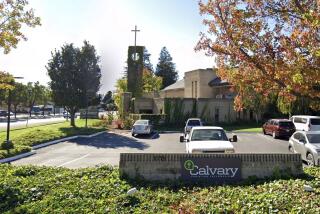Constitution Protects Moon Church Recruiting Methods, Court Rules
SAN FRANCISCO — Recruiting techniques used by the Unification Church are constitutionally protected, a state appeals court has ruled in throwing out a suit by former members of the church.
The 1st District Court of Appeal has ruled that as long as the church led by the Rev. Sun Myung Moon did not use force or the threat of force in recruitment, freedom of religion under the Constitution prohibits a court from inquiring into “the spiritual nature of its hold on its members.”
The ruling this week dismissed the suits by former “Moonies” David Molko, Tracy Leal, Barbara Dole and alleged deprogrammers Neil Maxwell and Joseph Alexander Sr. It also allowed the church, on behalf of its members, to seek an order banning Maxwell, Alexander and Molko from trying to kidnap and deprogram members, in violation of the members’ constitutional right to travel.
‘Beguiling’ Methods
The Unification Church’s “beguiling and very intensive recruiting methods . . . seem objectionable to us,” said Presiding Justice J. Anthony Kline, writing for a three-judge panel. But he said the Constitution recognizes “the powerlessness of reason, and therefore the powerlessness of the law, to compass the mystery of religious faith.”
“The idea that religious doctrine can be (or, as some would have it, invariably is) manipulatively employed to subvert reason . . . is one we may entertain as individuals but which the First Amendment forbids us to consider as judges,” Kline said.
The suits accused the Unification Church of fraud, emotional distress, and in two cases false imprisonment.
Recruiters allegedly approached Molko, Leal and Dole, said they were part of the Creative Community Project, involved in social causes, and invited them to a meeting. The recruiters denied any religious affiliation when questioned by Molko, and the group’s affiliation with Moon’s church was not disclosed for weeks. The recruits were never forcibly restrained, and they joined the church after learning its identity.
Mind Control Techniques
But by the time each of the three learned the identity of the church, they claimed they had fallen under the sway of sophisticated mind-control techniques and could no longer exercise free will.
At the time of their recruitment, the court said, Molko was a 27-year-old lawyer from Pennsylvania, recently arrived in San Francisco; Leal was a 19-year-old from Santa Clara County, stopping in San Francisco on her way to visit Humboldt State University; and Dole, also 19, was on the University of California, Berkeley, campus.
They offered statements by psychologist Margaret Singer and psychiatrist Samuel Benson, who both described the Unification Church as a “cult” and likened its indoctrination methods to those used on prisoners of war.
The court said there was no evidence that any misrepresentations by the church induced any of the three to stay against their will.
Additionally, Kline said, a court cannot analyze such psychological techniques for attracting and retaining church members without conducting a constitutionally forbidden inquiry into “the authenticity and the force of the Unification Church’s religious doctrines.”
More to Read
Sign up for Essential California
The most important California stories and recommendations in your inbox every morning.
You may occasionally receive promotional content from the Los Angeles Times.









